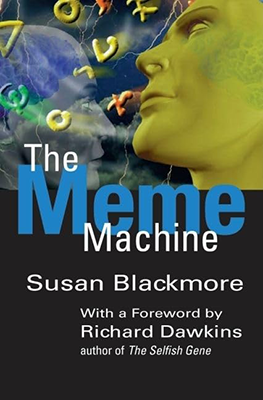The Meme Machine
“The Meme Machine” by Susan Blackmore is a captivating exploration of memes, the cultural replicators that shape human behavior and society. Here’s a summary:
Introduction to Memetics: Blackmore introduces the concept of memes, which are units of cultural information that are transmitted from person to person through imitation, language, and other forms of communication. She argues that memes are analogous to genes in that they undergo replication, variation, and selection, driving cultural evolution.
The Nature of Memes: Blackmore discusses the characteristics of memes and explores how they differ from genes. She argues that memes can be ideas, behaviors, skills, or cultural artifacts, and they can spread rapidly through human populations via imitation and communication.
The Spread of Memes: Blackmore explores the mechanisms by which memes spread through society, including imitation, language, writing, and the internet. She discusses how memes compete for attention and replication, leading to the proliferation of some memes while others die out.
The Evolution of Culture: Blackmore argues that memes are the driving force behind the evolution of human culture. She explores how memes shape human behavior, beliefs, rituals, and institutions, and how they influence the course of history and civilization.
The Memetic Brain: Blackmore discusses the role of the human brain in meme transmission and replication. She argues that the human brain has evolved to be highly receptive to memes, allowing them to spread rapidly and influence our thoughts, emotions, and behaviors.
Memes and Consciousness: Blackmore explores the relationship between memes and consciousness, arguing that memes have co-opted human minds to serve as their vehicles for replication and transmission. She discusses how memes shape our sense of self, identity, and reality.
The Future of Memetics: Blackmore reflects on the future of memetics as a field of study. She discusses the implications of memetic theory for understanding human behavior, culture, and society, and she considers how memetics can inform efforts to address global challenges such as climate change, inequality, and conflict.
Overall, “The Meme Machine” offers a fascinating and provocative exploration of memes and their role in shaping human culture and evolution. Blackmore’s engaging writing style and interdisciplinary approach make the book accessible to a wide audience, making it a must-read for anyone interested in understanding the power of ideas in shaping our world.

